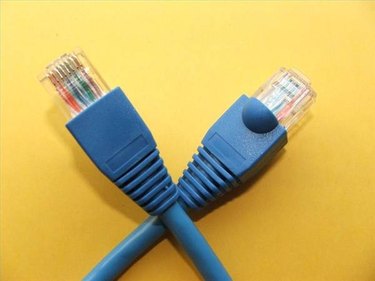An RJ45 cable is primarily used to connect devices over an Ethernet connection. For example, computers, printers, network storage devices, and cable or DSL modems, are some devices capable of using an RJ45 connection. Being able to identify an RJ45 cable is important when attempting to connect devices to a network.
Types of RJ45 Cables
Video of the Day
There are two types of RJ45 cables in everyday use: standard patch cables and crossover cables. The standard patch cable may be used, for example, to connect a computer to a network router/switch, or to connect a cable modem to a router/switch. The crossover cable is most often used to connect two computers directly without the use of a router or switch. These cables look identical; the only difference is the termination of the wiring in the cable's plug. Unknowingly using a crossover cable when a standard patch cable is needed probably will not cause damage to the network components--the devices merely won't form a connection.
Video of the Day
Uses
RJ45 technology is frequently used in home and business networking contexts to connect multiple computers both to each other and to the Internet. Additional network-capable devices can also be attached using RJ45 cables. For example, an office may connect a laser printer to its network using RJ45 cables, thus allowing anyone connected to the network to print to the shared printer. Rather than maintaining an expensive computer server, a company may opt to connect a NAS device (network-attached storage) to a network using an RJ45 cable, thus allowing other users connected to the network to access files stored on the NAS device.
Competing Technology
RJ45 cables are popular choices for most networking needs. Fiber optic technology, however, is a more expensive option that allows for greater speed than RJ45 cables. Wireless technology allows devices to be networked, as well. However, wireless technology has two major faults and prevents the technology from directly competing with RJ45 cables. First, data cannot be transmitted as quickly over wireless connections as it can be through an RJ45 cable. Second, wireless technology has the potential to expose data transmitted over the airwaves to persons with devices capable of "listening" to data transmitted wirelessly; to access communications over a network exclusively using RJ45, a person would need physical access to the network.
Appearance of an RJ45 Cable

An RJ45 cable consists of a length of cable with a male modular plug crimped to each end of the cable. The male plugs have 8 flat conductor contacts placed parallel to the connector body. When the male plug is connected to the female socket, the conductors meet and create an electrical connection.
Caution
The male plug of an RJ45 cable looks similar to a standard telephone cable in the United States because both cables use modular connectors. The RJ45 cable is larger than a standard telephone cable. Attempting to plug a telephone cable into an RJ45 female socket can damage the connectors in the socket.